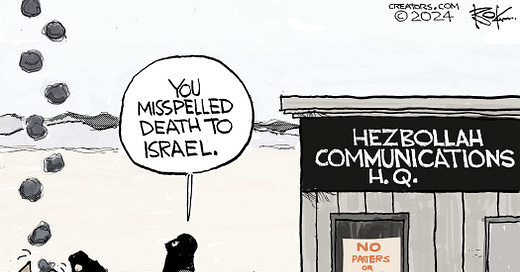Dear Investors,
Welcome to this week’s edition of the Myth of Money. If you would like to keep in closer touch, please reach out on X below.
This week, the Middle East stands on the precipice of an all-out regional war, drawing in international actors as the conflict between Israel and Hezbollah reaches new heights. In the aftermath of an Isnaeli airstrike that killed Hezbollah leader Hassan Nasrallah, tensions are spiraling, with Iran and its allies vowing retribution. Meanwhile, the U.S. has significantly ramped up its support for Israel, pledging $8.7 billion in military aid as fears of a broader conflict grow.
Israel's assassination of Hezbollah leader Hassan Nasrallah marks a significant turning point in the ongoing hostilities. Nasrallah was killed in a powerful series of airstrikes in Beirut on Friday, September 28, an escalation that has seen more than 1,000 people killed and thousands more displaced. Hezbollah, the powerful Iranian-backed militia, confirmed Nasrallah’s death, promising that the strike "will not go unanswered."
The Israeli campaign has targeted Hezbollah’s leadership and military infrastructure, and the death of Nasrallah could pave the way for Israel to further diminish Iran’s influence in the region. Analysts argue that Israel now has a "generational opportunity" to significantly weaken Hezbollah, which has long been a major player in the Middle East, particularly in Lebanon.
As many as one million people have been displaced in Lebanon, according to the country's prime minister. Lebanese citizens are seeking shelter in whatever safe spaces they can find, from the streets to the beaches.
On the ground, Israel has continued its bombardment of Hezbollah targets, destroying rocket launchers and military infrastructure. The strikes, according to Israeli military officials, are designed to neutralize Hezbollah’s ability to attack northern Israel. Meanwhile, Hezbollah has launched hundreds of rockets into Israel, targeting cities like Tel Aviv, though many of these missiles have been intercepted by Israel's air defense systems.
Iran's Calculated Response
Iran, Hezbollah’s primary backer, has made it clear that Nasrallah’s assassination will not be ignored. Tehran has long supported Hezbollah as a key component of its regional strategy to counter Israeli and U.S. influence. Iran’s next move is being watched closely, as further escalation could pull in more regional powers, creating a conflict with far-reaching consequences.
At the same time, Iran’s position on the world stage is complicated by its ties to Russia. Russian Prime Minister Mikhail Mishustin is set to meet with Iranian President Masoud Pezeshkian in Tehran, in talks that will focus on strategic cooperation. While Russia has condemned the killing of Nasrallah as a "political murder," it remains entangled in its own conflict in Ukraine, where Iran has been accused of supplying military drones to Moscow.
As the conflict intensifies, the U.S. is becoming more deeply involved. The Biden administration has pledged an additional $8.7 billion in military aid to Israel, despite growing calls for a ceasefire. President Biden, while emphasizing the need for diplomacy, has signaled his support for Israel's right to defend itself but urged for restraint amid escalating violence.
The Pentagon is now reviewing its options to increase troop presence in the region, in case the conflict spills beyond the Israel-Lebanon border. As the U.S. considers its role in the unfolding crisis, there is a palpable sense of unease among officials in Washington, who are wary of becoming mired in another protracted Middle Eastern conflict.
The assassination of Hassan Nasrallah has fundamentally changed the trajectory of the conflict in the Middle East. With Hezbollah vowing revenge, Iran’s calculated posturing, and Israel pursuing an aggressive military campaign, the potential for a wider regional war has never been more apparent. As the U.S. ramps up military aid to Israel and global powers like Russia continue to maneuver behind the scenes, the coming weeks will be critical in determining whether the region descends into a full-scale war or if diplomacy can prevail in time to prevent further catastrophe.
As we have seen in over the last year, threat of an all out war in the middle east usually follows by a drop in the markets. Bitcoin, however, continues to be best positioned as a hedge against the struggle between global powers.
This Week By the Numbers 📈
Markets & Economy 📊
Crypto & Blockchain 🚀
Politics & Regulation ⚖️
Top Stories 🗞️
Inside the Biden Admin’s Plot to Destroy Silvergate and Debank Crypto for Good
New bankruptcy filings and exclusive interviews with confidential sources suggest Silvergate could have survived if not for pressure from regulators, which allegedly included an informal mandate to cap its crypto deposits at 15 percent. Sen. Elizabeth Warren all but accused Silvergate of aiding and abetting FTX’s crimes, creating an “atmosphere of concern” around Silvergate that possibly contributed to a run on the bank. Sources told us the FHLB (Federal Home Loan Banks) refused to renew their monthly loan agreement with Silvergate due to political pressure from Warren, accelerating the bank’s losses. Claims of criminal wrongdoing related to Silvergate’s association with FTX have never been proven, and no criminal charges have ever been filed against the bank. Silvergate’s downfall may have been a primary cause of the 2023 regional banking crisis, which ultimately took down Signature, Silicon Valley Bank, and First Republic.
PayPal Enables Business Accounts to Buy, Hold, and Sell Bitcoin And Crypto
PayPal Holdings, Inc. (NASDAQ: PYPL) has enabled its U.S. business account holders to buy, hold, and sell cryptocurrency supported on its platform, such as Bitcoin, directly from their PayPal accounts. While this service is available nationwide, it will not be available in New York State at launch, PayPal stated. "Since we launched the ability for PayPal and Venmo consumers to buy, sell, and hold cryptocurrency in their wallets, we have learned a lot about how they want to use their cryptocurrency," said Jose Fernandez da Ponte, Senior Vice President of Blockchain, Cryptocurrency, and Digital Currencies at PayPal. "Business owners have increasingly expressed a desire for the same cryptocurrency capabilities available to consumers. We're excited to meet that demand by delivering this new offering, empowering them to engage with digital currencies effortlessly."
Visa to Help Banks Issue Fiat-Backed Tokens on Ethereum Via New Tokenized Asset Platform
Payments giant Visa (V) has developed a new product to help banks issue fiat-backed tokens on the Ethereum network. Visa Tokenized Asset Platform (VTAP) will enable the development of fiat-backed tokens powered by smart contracts to help digitize and automate existing processes that will then power the exchange of real-world assets (RWAs), according to an announcement seen by CoinDesk. A bank would use Visa's new platform to purchase tokenized RWAs such as commodities or bonds with near-real-time settlement, using a token, the statement said. One of the first financial institutions to use VTAP will be Spanish bank BBVA, who expects to rollout a live pilot in 2025.
Trump says he’d create a government efficiency commission led by Elon Musk
Former President Donald Trump said Thursday he would create a government efficiency commission to audit the entire federal government, an idea suggested by billionaire Elon Musk, who would lead it. The commission is the latest attention-grabbing alliance between Trump and Musk, who leads companies including Tesla and SpaceX and has become an increasingly vocal supporter of Trump’s bid to return to the White House. The Republican presidential nominee claimed that in 2022, “fraud and improper payments alone cost taxpayers an estimated hundreds of billions of dollars.” He said the commission would recommend “drastic reforms” and develop a plan to eliminate fraud and improper payments within six months, which he said would save trillions of dollars. “We need to do it,” Trump said. “Can’t go on the way we are now.” Trump also promised to cut 10 government regulations for every new regulation implemented if he’s elected in November.
SEC Approves BNY Custody of Crypto Beyond ETFs
The SEC has approved the Bank of New York Mellon Corp (BNY)’s custody of crypto assets beyond crypto ETFs. SEC Chair Gary Gensler revealed the revelation Thursday following a speech in front of the Fed of New York. The BNY Bank controls $2 trillion in assets and has now been approved by the Securities and Exchange Commission to offer crypto custody services. The structure that BNY currently uses to offer its crypto custody services already includes Bitcoin and Ethereum ETFs. However, the bank recently presented a plan to the SEC’s Office of Chief Accountant to custody those two assets in a way that would protect customer funds in the event of bank insolvency. The SEC granted BNY with a “non-objection” to the plan.
“Myth Of Money” Book - Shipping this week! 🤓
As many of you know, making financial education accessible has always been a passion of mine, and I’ve always offered it for free!
After a year of hard work, I'm excited to announce that my new book, published by Wiley Publishing, will be officially available on October 1st!
This book is a thrilling blend of personal stories from the financial world, coupled with clear explanations of how things really work—from investment banking and stocks to venture capital, macroeconomics, and cryptocurrencies.
How can you support?
For individuals the book is available for sale on Amazon!
If you pre-order and leave a review, I will add you to my personal Telegram group, where I share exclusive investment tips and tricks! Just email me a screenshot of both the pre-order and review, along with your Telegram ID.
For bulk orders, we offer discounts if you order 10 or more copies for your business or educational institution. Additionally, we are setting up a donation program for corporates interested in donating books to schools. If this interests you, please reach out to me directly!
Thank you for reading this week’s edition of the Myth of Money.🚀
Were you forwarded this email? Subscribe below.
Until next week,
Tatiana Koffman
About the Author: Tatiana Koffman
Hi there and thanks for reading! If you stumble upon my newsletter, you will notice that I write about money, economics, and technology. I hold a JD/MBA and spent my career in Capital Markets working across Mergers & Acquisitions, Derivatives, Venture Capital, and Cryptocurrencies. I write to make financial topics more accessible and create equal opportunity for the next generation of investors. Currently working as a proud General Partner at Moonwalker Capital.
(More about me 👉 here).






H8